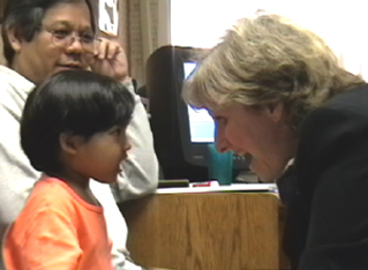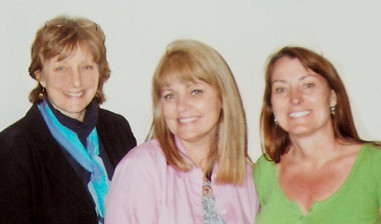Every parent has a first child!
 Over the last nearly 40 years at The Music Place, I have had the privilege of meeting over 9,000 kids and their parents for the purpose of helping them navigate the journey of music education together. I have to admit that conducting these assessments and meeting so many wonderful families has been one of the bright spots of my position as The Music Place director. I thank God, our fabulous staff and those of you who have supported and encouraged my efforts to care for you and your kids. It is only appropriate that I begin to share more regularly some of those things that I have learned along this amazing journey of my own.
Over the last nearly 40 years at The Music Place, I have had the privilege of meeting over 9,000 kids and their parents for the purpose of helping them navigate the journey of music education together. I have to admit that conducting these assessments and meeting so many wonderful families has been one of the bright spots of my position as The Music Place director. I thank God, our fabulous staff and those of you who have supported and encouraged my efforts to care for you and your kids. It is only appropriate that I begin to share more regularly some of those things that I have learned along this amazing journey of my own.
One of the more profound things I have noticed over the years is a fairly consistent similarity among students who are either first born, first of their gender or first of a new group whose siblings are three or more years older. For the sake of simplicity, I will call them all “firstborns”. They all exhibit at least one sign of what I now call “First-child-itis” It's not exactly a disease, but it does need to be acknowledged and cared for. In fact, just understanding this about our firstborn kids has brought many “Aha!” moments (and some tears) to parents as we have addressed the “condition” together. Let me say right off the top that I myself am a firstborn, and exhibit many of the characteristics of an only child-- with two siblings who are six and nine years younger than I am.
Here are the typical and most common “symptoms” of "First-Child-itis"
Firstborns tend to be perfectionistic and hard on themselves. In my opinion, this is largely a result of several issues:Their primary role models are “perfect” adults or significantly older siblings whom they perceive as perfect and worthy to be emulated (why not?)
- For their own training and protection, children are hardwired to trust and believe their parents are perfect (see last month's article on ornaments). They usually feel deep down that they should also be perfect
- First-time parents have both the highest expectations of their kids and the least experience raising them than others (if any) in the birth order. (Weren't you a little idealistic with YOUR first child?) This puts pressure on a child to achieve.
- In addition to prevalent cultural models, we as parents just find it easier to honor achievement over character and inadvertently perpetuate the lie in #5.
- Whether conscious or not, sadly, most firstborns believe the internal lie that their achievement generates their personal acceptability.
- Firstborns fear failure or making a mistakes because it feels like rejection: the worst human fear. This makes them extremely sensitive to even a hint of criticism
Firstborns usually work harder than others in the birth order (or those whose siblings are closer in age) This is largely for the reasons noted above. Of course a strong work ethic is admirable, but it is not okay if a child cannot relax inside because the work is driven out of fear or emotional reaction to pain.
If they do not become driven, they will likely give up. Some firstborns give up (at least on some things) when they feel they cannot meet expectations, feeling that being driven is futile. They feel they can never meet expectations. They frequently feel “not good enough” or “inadequate”.
Firstborns are likely to be more strong-willed than their siblings:
This is partly because they have had the full attention of the parents and feel safe in their care. They feel secure enough to go “where angels fear to tread.” It can also occur when parents have not clarified the boundaries and give away their own authority by bowing to the demands of the child. Please NOTE: There are MANY reasons a child will exhibit strong will or need to control, including feeling fearful and out of control, but that is an article for another day.
They are more likely to become leaders. In my twenties, I attended a gathering which among other things, addressed the issue of birth order. As a practical application, the speaker asked those from the group of about 15,000 to stand if they were firstborns. I was astounded as I experienced the sound of about 75% of the audience standing to their feet. It is not a surprise that firstborns attend conferences to grow in their skills and ability. They are usually secure, used to being in charge, have already pioneered unknown territory in their family and driven to move forward.
How do we care for a first-born child?
In other words, how do we adderss "first-child-itis" and help our children flourish?
Let me first say that teachers love firstborns because they work so hard! Having said that, I think there are five keys to raising a happy and well balanced firstborn (or weathering the adolescent transition that comes in time):
- Because first-borns believe their acceptability is related to achievement, every day, look your child in the eye. Communicate your care with your heart (not your "head") and communicate to their (often fearfully) driven inner child that they are precious to you (quite apart from their achievement). Assure them that there is nothing they can do that will make you stop loving them. NOTE: If this means easing up on your expectations from time to time, do it. Caring for your child's heart is worth more than their achievements can ever provide. (In fact, you will likely see your child excel even more!)
- Aim to help your child relax inside by making some obvious (if intentional) mistakes in front of your child. Show them how you recover from them. Teach them that life and learning to live is about making mistakes and learning from them-- and that parents make them too. If your mistake is not intentional and it hurts your child, of course, go to them in humility and acknowledge that you were wrong—which, as we teach our kids, is more important than simply saying “ I'm sorry.” These are the moments that will do more to build a child's heart and fill the heart reservoir than almost anything else. A full heart does not need to drive itself with the draining and exhausting anxiety of focusing on achievement alone.
- Look for the feelings and needs behind the behavior. I believe this is the MOST IMPORTANT thing we can do for our kids. My husband Mike and I wish we had not discovered this so late in our child raising years. Like many parents, we focused so much more on behavior rather than recognizing inappropriate behavior as symptomatic of unmet needs or emotional distress.
- Accept and care for their underlying needs. We all have God-given needs for acceptance, focused attention, value, comfort, affection, respect, security, comfort and more. It is appropriate (not shameful as many of us were taught) for us to need these things, and it is also God's design for us as parents to give these things to our kids.
- Focus on character versus achievement. In our accomplishment-driven culture, it much easier to acknowledge the accomplishment of tasks rather than the character that produced them; however, we need to postively reinforce the attitudes of our kids and the character qualities that we believe are important in life. For example, instead of simply saying "Good job!", consider acknowledging the other more intangible qualities like "Great choices to use your time so effectively!, or "I am very proud of you for the respectful way you responded to my request to do his homework!"
What are some practical ways we can implement these suggstions?
 To answer this important question, we must ask ourselves (and our kids if they are verbal): “What is it that you (they) are feeling?” What is the underlying fear or pain that has precipitated this attitude or behavior? My favorite question is “What's going on inside of you right now ?” or “How can I care for your pain?”
To answer this important question, we must ask ourselves (and our kids if they are verbal): “What is it that you (they) are feeling?” What is the underlying fear or pain that has precipitated this attitude or behavior? My favorite question is “What's going on inside of you right now ?” or “How can I care for your pain?”
Even if your child does not know the answer, your asking it without pressure and from the heart not only communicates a depth of care that will often meet a huge need, but it causes kids (and spouses) to begin to ask themselves the same questions. This facilitates growth in the areas of emotional health and intelligence that we all need to be truly successful.
Important Reminder: If you are fortunate enough to have a child who can answer these kinds of questions and who ventures to share his or her heart with you, by all means, acknowledge these feelings! Be prepared to put aside all the “facts, reason and logic” that you want to use to contradict the feelings they have. (i.e. "you should not feel that way because..." rather than "I am so sad that you feel this way.")
Let's not forget that our feelings (and consequently our reactions and behaviors) are rarely based on reality, but rather on OUR PERCEPTION of reality. It never meets my emotional need to have intellectual information, but it only takes one person to consistently care about my heart to help me get through the reactions I have when I am stuck.
This is the privilege and calling of a parent.
For more information on birth order psychology, read Dr. Keven Lehman's book, The New Birth Order Book or Milan and Kay Yerkovich's book, How We Love Our Kids

